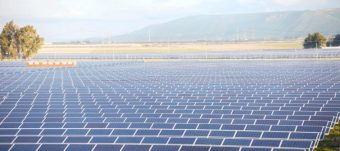
Egypt has set ambitious targets for the roll-out and expansion of renewable generation and transmission infrastructure over the next few years. And ABB is in an excellent position to help the country achieve its ambitions to transform its energy market.
Over the past few years, Egypt has emerged as a regional leader in harnessing wind energy for electricity generation. This has been driven by a national strategy, initiated by Egypt’s New and Renewable Energy Authority (NREA) in February 2008, to diversify electricity generation, rationalize the use of energy and expand renewable energy sources. Renewable energy is seen as a key way of transforming the country’s key development pillars of power, health, infrastructure, education, and people.
The stated aim of the NREA strategy is to raise the contribution of renewable energy sources to 20 percent of total electricity generation by 2020. Of this, grid-connected wind power will account for some 12 percent of total electricity generation (7.2 GW total capacity), with hydropower and solar energy also providing significant contributions.
Demand for electricity is growing rapidly in Egypt; at an estimated additional 1,500 to 2,000 MW per year, as a result of rapid urbanization and economic growth. Recently, Egypt has suffered severe power shortages and rolling blackouts, so the need for alternative energy options is a pressing one.
However, there is a lot of work still to do to meet the 2020 renewable energy goal. Egypt’s total installed wind generation capacity at the end of 2015 was 810 MW or one percent of the country’s total electricity generation.
The country is recognized as having some of the world’s best wind resources, especially in the Gulf of Suez area and along the east and west banks of the Nile.
Egypt’s best-developed wind region so far is the Zafarana district, with average wind speeds of around nine meters a second.
As part of its drive to harness renewable energy sources, the NREA is also driving the unbundling and liberalization of Egypt’s energy market, and the transformation of the Egyptian Electricity Transmission Company (EECT) into an independent operator, with a massive program to expand and improve transmission infrastructure.
This and other aspects were recently discussed at the Roundtable, Egypt’s Renewables Strategy (hosted by Open Chance and Andrews Kurth in collaboration with NREA and organized by MEED – Middle East Business Intelligence) in which I participated in Cairo on May 31.
ABB stands ready to help the NREA and EECT to meet these ambitious targets, driven by local support from our entire organization. ABB is well positioned to support Egypt in the planning, development, construction and grid integration of wind power plants.
ABB is one of the few vendors that have been involved in the commercialization of wind power since its earliest days. As the largest supplier of electrical components, systems and services to the wind power industry, we have decades of experience and have installed more equipment in wind farms than any other supplier.
ABB’s capability runs right through the value chain, from consultancy at the very beginning of a project to create the optimum layout for a wind plant, through creating the ideal electrical drivetrain package for the wind turbines to controlling and automation the wind plant operation, collecting the power generated and integrating it into the local grid.
Source: abb.com


